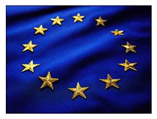EU plans energy 'industrial revolution'
 Brussels, Belgium - The European Commission has presented a three-year road map towards a common European energy policy, with the aim of achieving a 20% reduction in greenhouse gas emissions 2020. The Union is seeking to mitigate the risk of relying on energy imports and oil supplies from a few external suppliers, as well as climate change.
Brussels, Belgium - The European Commission has presented a three-year road map towards a common European energy policy, with the aim of achieving a 20% reduction in greenhouse gas emissions 2020. The Union is seeking to mitigate the risk of relying on energy imports and oil supplies from a few external suppliers, as well as climate change.The Commission began debating future European Union energy policy with the publication of a Green Paper in March 2006. With the recent series of energy reports and policy proposals, the EU government hopes to catalyze for “a new industrial revolution” that will “transform Europe into a highly energy-efficient and low-CO2 energy economy” by 2050
See: EU releases Energy Green Paper
“The days of secure, cheap energy for Europe are over,” the EU executive warns in a Strategic Energy Review, which forms the centre-piece of the package. A “common European response is necessary” to address climate change, energy import dependence, and higher energy prices, it notes. “With current trends and policies, the EU’s energy-import dependence will jump from 50% of total energy consumption today to 65% in 2030,” the Commission states. By that year, dependence on gas imports will have increased from 57% to 84% and oil imports from 82% to 93%, making Europe increasingly vulnerable to major oil and gas producers, the report warns.
As energy accounts for the majority of carbon dioxide emissions, it is central to the climate change issue. The EU Commission predicts that despite current efforts, European greenhouse gas emissions will increase by “around 5% by 2030”, making the “EU’s present energy policy is not sustainable”.
“The point of departure for a common energy policy must be combating climate change, promoting jobs and growth and limiting the EU’s external vulnerability to imported hydrocarbons,” the Commission says.
According to one senior EU official, the objective should be a 20% reduction in greenhouse gases by 2020, which would translate to around a 15% CO2 reduction compared with the Kyoto Protocol’s base year of 1990, reports Euractiv.
Concrete steps put forth include:
- Completing the internal market for electricity and gas with “a clearer separation of energy production from distribution” for large energy utilities and “stronger independent regulatory control which considers the interests of Europe as a whole”, not just national interests, “as is too often the case at present”;
- A target for renewable energies for 2020, which some EU officials say could be set at 20% of Europe’s total energy consumption;
- A minimum target for biofuels for 2020;
- An objective to improve energy efficiency by 20% by 2020;
- A big push for energy research and development with an increase by “at least 50%” of annual spending over the next seven years on low-carbon technologies;
- A solidarity mechanism to deal with supply crisis, including a new energy observatory and a network of energy correspondents, and;
- A common external energy policy to forge closer relations with main supplier, consumer and transit countries.
You can return to the main Market News page, or press the Back button on your browser.

